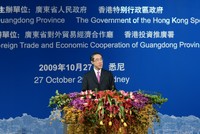 |
| No.7 October, 2009 |
|
| |
|
| |
Chief Secretary Henry Tang woos Australian investors |
|
| |
|
|
| |
 More than 2,000 top Australian business executives attended the "Hong Kong-Guangdong Business Conference in Sydney 2009" (October 27), jointly organised by the Government of the Hong Kong Special Administrative Region (HKSAR) and the People's Government of Guangdong Province. More than 2,000 top Australian business executives attended the "Hong Kong-Guangdong Business Conference in Sydney 2009" (October 27), jointly organised by the Government of the Hong Kong Special Administrative Region (HKSAR) and the People's Government of Guangdong Province.
The Business Conference in Sydney is the eighth overseas investment promotion event jointly organised by Hong Kong and Guangdong Province since 2003. This has brought together representatives from the Governments of Guangdong and Hong Kong as well as the business sector in Australia, and highlighted the advantages and prospects of investing in the Greater Pearl River Delta (PRD) region. Australian companies were encouraged to capitalise on the synergy of economic co-operation in the region, including both Hong Kong and Guangdong. |
|
| |
|
|
| |
The Business Conference was officiated by Mr Nathan Rees, Premier of the Government of New South Wales; Mr Peter Yuile, Deputy CEO of Austrade and Mr Zhang Junsai, Ambassador of the People's Republic of China to the Commonwealth of Australia. Mr Huang Huahua, the Governor of Guangdong Province and Mr Henry Tang, Chief Secretary for Administration of the HKSAR, delivered keynote speeches and encouraged Australian investors to make best use of the favourable investment climate and prospects for business growth in this region, which are especially attractive during the initial recovery stage of the global economy.
Speaking at the Conference, Mr Tang updated the Australian business leaders on the latest developments of Hong Kong and the concerted efforts of the two governments in promoting business opportunities to investors.
Mr Tang said that over the past 30 years, Hong Kong and Guangdong had forged very close co-operation as the PRD Region became the world's factory, and Hong Kong had benefited tremendously through transforming itself into a services-oriented economy. Focusing on the economic benefits of Hong Kong-Guangdong co-operation, Mr Tang said that the Central Government had announced a "Framework" document to develop and reform the PRD region. The Framework reaffirms Hong Kong's status as a global financial, trading and logistics centre and supports expanded co-operation between Guangdong and Hong Kong and Macao. Closer co-operation between Hong Kong and Guangdong in terms of both soft and hard infrastructure will enable the entire PRD region to become one of the most competitive regions in the world by 2020.
Mr Tang also outlined the mega infrastructural projects that will enhance connectivity between the PRD Region and Hong Kong. These include the Guangzhou-Shenzhen-Hong Kong Express Rail Link; a 29-kilometre bridge that will connect Hong Kong with Macao and Zhuhai in Guangdong; and a possible rail link between Hong Kong International Airport and Shenzhen Airport.
Highlighting the close economic ties between Hong Kong and Australia, Mr Tang said, "Some 50,000 Australians live and work in Hong Kong and around 600 Australian companies have a presence in our city. About 70 of these firms have their Regional Headquarters or Regional Offices in Hong Kong and many of them are increasingly engaged in business across the boundary in the Mainland. Hong Kong shares many characteristics that are cherished by Australian entrepreneurs, including a free flow of information and capital, a fully convertible currency, an independent judiciary, and our low and simple tax system." Mr Tang pointed out that notwithstanding the challenges of the financial crisis, Hong Kong had emerged from recession in the second quarter of this year while maintaining all its fundamental strengths.
Mr Tang said, "To achieve a sustainable economic recovery, we have identified six industries where Hong Kong has a clear competitive advantage and strong potential for growth. These are education services, medical services, innovation and technology, testing and certification, environmental industries and, creative and cultural industries. Though Hong Kong Government is well-known for its 'hand's off' approach towards business, we are prepared to facilitate development in these industries by making available adequate land resources and encouraging businesses to embrace a culture of research and development." Mr Tang added that Hong Kong's close co-operation with Guangdong and the Pearl River Delta will directly benefit each of the knowledge-based industries.
To enhance the competitiveness of Hong Kong and attract the brightest talents, Mr Tang said that Hong Kong had embarked on an exciting cultural development project. "The West Kowloon Cultural District, a 40-hectare site along Victoria Harbour, will be transformed into 15 arts facilities with the first phase scheduled to open in 2014/15. We are confident that the Cultural District will draw audience not only from Hong Kong, but from around the region and indeed the world."
Concluding on a positive note, Mr Tang said, "The opportunities in Hong Kong and our strong connectivity with Guangdong is helping to set the pace for economic recovery and sustainable growth."
During the conference, Mr Grahame White, General Manager, Strategy and Communications of Leighton Asia Limited and Mr Rob Harmsen, Group General Manger of Nuplex Resins also shared their successful experience in investing in Hong Kong and Guangdong respectively. There was also a lively exchange of views amongst the Australian business executives with Mr Henry Tang and Mr Huang Huahua on economic prospects of the PRD region in the Conference.
|
|
| |
|
|
|
| |
 |
|
|
| |
|
|
|
| |
|
|
|
|
 |

